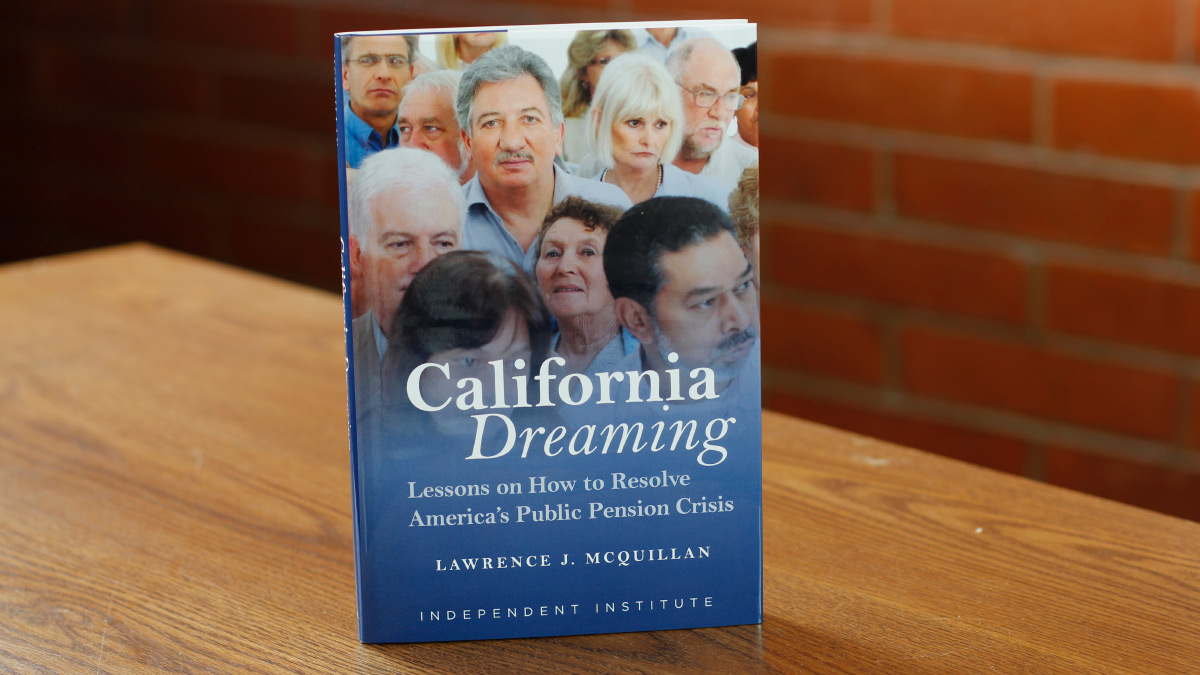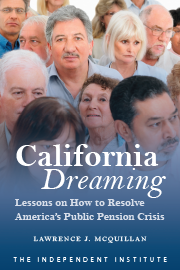California is known for crises: the workers’ compensation crisis in the early 2000s, the budget crisis following the 2008–09 Great Recession, and the water crisis that has threatened parched California. But the biggest crisis of them all is the state’s government pension problem.
California’s state and local government employees receive defined-benefit pensions that guarantee specific monthly payments to retirees for life. A leading study found that California state workers receive a compensation premium of about 30 percent from their government pensions alone, compared to identical private-sector workers in California.
In theory, these generous pensions are paid for by taking contributions from government agencies and their employees, investing the contributions, and using the investment proceeds to pay the promised pension benefits 20, 30, or 40 years down the road after employees retire.
But in reality, pension officials and politicians of both political parties have deliberately lowballed the contributions and increased the benefits such that there isn’t enough money in the bank today to eventually pay the promised benefits. This deficit is called an unfunded pension liability, and now taxpayers are on the hook to make up the difference between pension promises and pension assets.
California’s unfunded public pension liability, when measured correctly, is two to four times as large as official government estimates: at least $23,000 per California household, and even higher if you live in a community with an unfunded city or county pension plan.
In total, California’s 86 defined-benefit public pension plans are underfunded by a staggering $430 billion. This is the state’s greatest financial challenge since the Great Depression.
The massive tax increases needed to make state and local pension funds solvent have proven to be politically impossible to enact, making the pension systems financially unsustainable. The failure to fully fund the pension promises has allowed the current generation to receive public services that they are not fully paying for, pushing the pension problem onto future generations. Politicians kick the can down the road as pension debts mount.
The unwillingness to confront the true scope of California’s pension costs, to pay for the promises made, and to make changes to control future obligations means these costs are being pushed onto California’s children and grandchildren, who are being forced to pay for promises they did not make and for services they did not agree to. The injustice of this system is apparent to anyone who cares to see.
Left unchanged, the financial burden of the pension problem will crush younger generations, leaving them with a depleted future and a depleted California. The responsibility to fix this problem is as great as any moral imperative because it directly
impacts the quality of life our children will enjoy and their chances for upward mobility.
Fortunately, it is not too late to fix the problem.
In my forthcoming book, California Dreaming: Lessons on How to Resolve America’s Public Pension Crisis, published by the Independent Institute, I explain how six reforms would solve California’s pension problem in an equitable, responsible, and sustainable way that preserves pension benefits already earned, provides competitive pensions going forward, and grants the flexibility needed, so that future generations are not paying for deals they did not make.
The recommendations—most already in place in the private sector—would require financial transparency and full annual funding of each pension plan without “pension obligation bonds.” Also, the reforms would give state and local governments the flexibility to switch to defined-contribution pension plans going forward for all employees. In addition, voters would be required to pre-approve any pension plan change that increases financial obligations.
California Dreaming also explains that current and future retirees would be wise to accept the recommended reforms because the alternative could be much worse for them. Recent federal bankruptcy court decisions in both the Detroit and Stockton municipal bankruptcies have ruled that pension checks of current and future city retirees may be cut in bankruptcy proceedings. Both cities were driven into bankruptcy by unaffordable pension obligations.
The reforms offered in California Dreaming would bring California’s public pensions in line with those in the private sector and ensure that California never faces such a crisis again. It is time to fix California’s pension crisis permanently to help restore the California dream and provide a reform blueprint for the rest of America.










